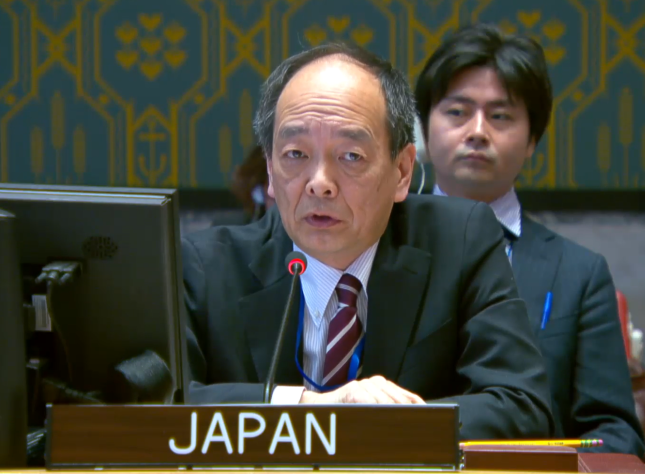シリア政治及び人道情勢に関する安保理会合における山中大使ステートメント
令和5年11月28日

(As delivered)
Mr. President,
I would like to thank Deputy Special Envoy Ms. Rochdi and the Director of OCHA Ms. Wosornu for their valuable updates.
The world's attention is now focused on the deepening crisis in Gaza. Yet not only do we need to prevent the spillover effects of the Gaza crisis on the Syrian security situation, but also we must not forget the plight of the Syrian people. After more than a decade of war, millions remain refugees or internally displaced, tens of thousands were killed by the devastating earthquakes in February, and nine in 10 are in poverty. Those who knew Syria before the “Arab Spring” could have never imagined such a catastrophe.
Mr. President,
Syria is in desperate need of a political solution, yet none appears imminent. It is unlikely that the Constitutional Committee will be able to convene before the end of this year. The formation of the Arab Contact Group following Syria’s return to the Arab League in May offered much promise for a regional role in resolving the Syrian crisis, but progress has been slow.
The Council continues to support the step-by-step approach of Special Envoy Pederson, although his efforts have been complicated by the intertwined interests and involvement of many actors both internal and external. Yet we do not have the luxury of losing hope. This Council must remain engaged and reaffirm the importance of a political solution in accordance with Resolution 2254.
Mr. President,
Humanitarian needs across the country are at their worst levels ever with no sign of improvement. Support for early recovery and resilience building is critical, and Japan, as a major donor, continues to address this crisis in collaboration with the UN and NGOs, under a “people-centered” and “whole-of-Syria” approach. We encourage donors to make collective and further efforts to the Humanitarian Response Plan which is currently severely underfunded.
With winter approaching, the Syrian government's decision to extend the use of the Bab Al-Salam and Al-Ra'ee border crossings for an additional three months is a welcome step that will contribute to facilitating needed aid to the 2.9 million displaced people, mainly women and children in northwest Syria.
To address the Syrian refugee crisis, much more effort is needed from the Syrian government to create an enabling environment for a safe, voluntary, and dignified return.
It is also essential that the government addresses in good faith the issue of the disappeared, estimated at more than 130,000. The General Assembly’s decision to establish the Independent Institution of Missing Persons in July was an important move, and Japan will support this institution so that it can begin substantive work in the near future.
Also, it is urgently needed to advance the reconciliation process. In this vein, Japan urges Syria to follow the recent ICJ order and take all measures to prevent acts of torture and other inhuman abuses.
Finally, as OCHA has pointed out, the “cost of inaction” on the Syrian crisis is extremely high. Without the prospect of a political solution, the country will remain unstable and humanitarian needs will not diminish. We would like to emphasize again that sincere and positive action by the Syrian government on the political track is the only way to build confidence in the international community.
I thank you, Mr. President.
